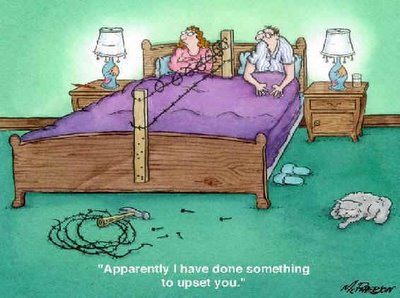In Sickness and in Health

Research shows a hostile marriage can be harmful to a woman's heart—in more ways than one.
WEB EXCLUSIVE
By Barbara Kantrowitz and Pat Wingert
Newsweek
Updated: 11:59 a.m. ET Dec. 27, 2005
Dec. 27, 2005 - Whatever else went wrong in the world this year, no one can complain about a shortage of celebrity breakups. From Jennifer Aniston's split with Brad Pitt in January to Jessica Simpson's divorce from Nick Lachey in December, 2005 was awash in ruined romance. But hold the tears--at least for the ex-wives. Bad marriages might have been making them sick. Researchers say that say long-term anger and hostility between partners is much more dangerous for women than men and can impair our immune system and put us at risk for depression, high blood pressure and even heart disease.
In a study published in the current issue of the Archives of General Psychiatry, Dr. Janice Kiecolt-Glaser and her colleagues at Ohio State University recruited 42 healthy couples who had been married an average of 12 years to spend two 24-hour stretches in a hospital research unit. On the first visit, the couples were encouraged to be loving and supportive of each other. On the second visit, they talked about their areas of conflict. On each visit, a special vacuum tube created blister wounds on their arms that were monitored for healing. The most antagonistic couples took an average of a day longer to heal. "Hostile marital interactions really enhance production of stress hormones, especially for women," Kiecolt-Glaser says. "And immune change is greater for women than for men."
What makes women so vulnerable to a husband's hostility? Kiecolt-Glaser, a professor of psychiatry and psychology, says women remember both positive and negative interactions more than men because they're generally more aware of the emotional content of a relationship. Women have larger and broader social networks than men, she says, and they're more sensitive to "adverse events" in their networks—a friend, a child, or a sister in trouble. That sensitivity is especially acute when it comes to their most intimate relationship, with their husband. A common laboratory strategy for studying marriage, Kiecolt-Glaser says, is to watch couples talk about a disagreement and then have each partner rate their own and their spouse's behavior. "Women's ratings of the behavior are much closer to the outside observer's codings of hostility than men's," she says. "Men simply don't see it."
Long-term unhappy marriages have serious health consequences. In another study published earlier this year in the Archives of Internal Medicine, researchers from the University of Pittsburgh and San Diego State University looked at data from more than 400 healthy women who were followed for 13 years before and after menopause. They found that marital dissatisfaction tripled a woman's chances of having metabolic syndrome, a group of heart-risk factors. Only widows were more likely to have metabolic syndrome than the unhappy wives; even divorced and single women had better health-risk profiles.
In other words, a bad relationship hurts a woman's heart in more ways than one. Unhappiness at home could even be fatal after a heart attack. A Swedish study published in the Journal of the American Medical Association in 2000 found that women with coronary heart disease had a greater risk of recurrence if they had severe stress in their marriages or live-in relationships. The researchers said that emotional strain and lack of support from a partner may mean that a woman is less likely to stick with heart healthy behavior and may not seek essential medical support. On the other hand, stress at work didn't appear to affect the health of the women who worked outside the home.
But before you kick your husband out, consider this: several studies have also shown that good marriages help keep women healthy. It's not just the absence of relationship stress (although that's certainly a factor). Women in happy marriages have strong social support, which generally encourages healthier behaviors. In fact, researchers have found that women in positive relationships actually benefit from spending more time with their partners.
What should you take away from all this? Kiecolt-Glaser says couples should learn to keep hostility in check. "When relationships are stressed," she says, "you see a 'tit for tat' kind of behavior where things really escalate. The most important thing is to cut that off early." All couples argue, she says, "[but] it's the quality of the disagreement that matters." She suggests that when you reach an impasse, you might say, "We really see this differently," rather than, "You idiot! How could you possibly think that?"
Kiecolt-Glaser's considerable expertise in this area no doubt benefits from the experience of her own happy marriage. She and her husband, Dr. Ronald Glaser, director of the Institute for Behavioral Medicine Research at Ohio State, have been together since 1978, both at home and in the lab. "He's a sweetie," she says. "I'm really, really fortunate. We disagree on some things, but it's a really good working partnership." And apparently, he's learned to value her judgment. When they were first dating, they sometimes socialized with a couple who were friends of his. "I couldn't stand to be around them because they were so abrasive with each other," she says. "He couldn't see it. Then they got divorced. He said, 'You were right.' And I said, 'Of course I was right'." A woman always knows.
© 2005 Newsweek, Inc.

0 Comments:
Post a Comment
<< Home